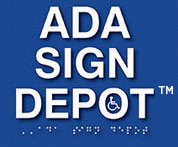Understanding Disability: Assistive technologies for people with disabilities
ADA Sign Depot
March 28, 2016

Assistive technologies for people with disabilities
Source:For The New Mexican
By Andy Winnegar
Andy Winnegar has spent his career in rehabilitation and is based in Santa Fe as a training associate for the Southwest ADA Center. He can be reached at a@winnegar.com.
Technology has reduced barriers and improved opportunities for many individuals with disabilities. Today, there are robotic floor cleaners, light sensors, voice activation and Bluetooth controls for almost anything.
The U.S. market for assistive technologies for people with disabilities is projected to grow to $55 billion by 2016, according to market forecasters BCC Research.
These growth projections include a new folding wheel designed for wheelchair users. Morph Wheels are the first-ever foldable wheelchair wheels, specifically for car or air travel.
Disconnected from the wheelchair frame, each wheel folds to roughly half of its open size for easier transport and storage. Since the wheels promise to reduce the strain and stress on shoulders and arms when transferring a wheelchair to a car, the wheels are not cheap, at $900 apiece.
Another new device is Tangible Play’s Osmo. The $79 iPad accessory expands learning beyond the iPad screen to manipulate real objects. Originally designed for children 6-12 years to encourage creative thinking and socializing, it also is useful for children and adults with expressive language deficits and other disabilities. Osmo includes colored wooden shapes, letters and a writing pad. If the user makes a mistake, the application will automatically lower the difficulty level. One game works on building a vocabulary of 2,000 words and identifying 200 images.
Wearable sensors and GPS devices provide real-time information on many aspects of personal health and safety including activity levels, heart rate, body position, location and even medication levels.
Lumo Lift is a $100 posture-tracking wearable device that is worn under clothing and near the collar bone. Promoted as a way to prevent and reduce back pain, and tied to a smartphone, it gently reminds you to sit straight and stand tall. A vibration alerts you when you have been slouching too long and shows ways to correct it.
A low-cost lightweight Braille printer for the blind is expected to be on the market later this year. The Braigo-v1, using Lego Mindstorms EV3, was invented by Shubham Banerjee, an eighth-grade student from Califonia. Tech giant Intel Corp. recently invested in its development.
As we have all experienced, however, there will be times when even the most reliable device will not work. If that is the case, the New Mexico Assistive Device Lemon Law may help you replace or repair the device or get your money back. New Mexico’s Lemon Law is similar to 38 other states providing a warranty for a minimum of one year on an assistive device.
An “assistive device” include wheelchairs, scooters, wheelchair lifts, hearing aids, Braille printers, communication devices and other equipment that a consumer purchases or accepts transfer of in New Mexico that is used for a major life activity.
The Americans with Disabilities Act definition of major life activities include, but are not limited to: major bodily functions, caring for oneself, performing manual tasks, seeing, hearing, eating, sleeping, walking, standing, lifting, bending, speaking, breathing, learning, reading, concentrating, thinking, communicating and working.
The customer is responsible for reporting problems to the company where they purchased the device, and making the device available for repair during the warranty period.
The manufacturer is responsible for repairing the device within 30 days at no charge to the consumer. If, after four attempts there are still problems with the device, the manufacturer, must replace it with a comparable new assistive device or refund the full purchase price plus any finance charge.
Rules concerning arbitration of disputes arising from nonconforming assistive devices and failures to comply with the Assistive Device Lemon Law are the responsibility of New Mexico’s Attorney General. Contact the Consumer Protection Division of the Attorney General’s Office for more information at 827-6009 or 800-678-1508.
Andy Winnegar has spent his career in rehabilitation and is based in Santa Fe as a training associate for the Southwest ADA Center. He can be reached at a@winnegar.com.
Shop all our Handicapped Parking ADA Signs
- Tags: ADA People Subscribe to this blog's RSS feed.


